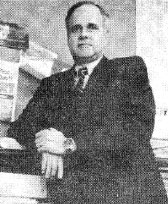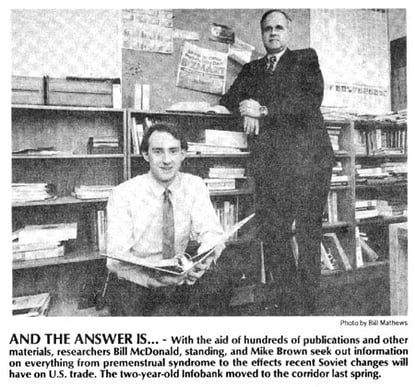 Our first week in Kansas City while unpacking boxes and listening to Mike Murphy’s radio show, I heard Bill McDonald talk about how his company, Kansas City Infobank, researched and identified market opportunities. While unsure about my career, I loved school, was good at it, and Infobank sounded like school. Thus began my “second MBA” – spending 2 ½ years at Infobank doing strategic projects for entrepreneurs, Fortune 500 companies, and everything in between.
Our first week in Kansas City while unpacking boxes and listening to Mike Murphy’s radio show, I heard Bill McDonald talk about how his company, Kansas City Infobank, researched and identified market opportunities. While unsure about my career, I loved school, was good at it, and Infobank sounded like school. Thus began my “second MBA” – spending 2 ½ years at Infobank doing strategic projects for entrepreneurs, Fortune 500 companies, and everything in between.
Despite our financial challenges as a small business, Bill became an important strategic mentor. As mentioned before, the business instruction he gave me encompassed lessons too numerous to list. One in particular transformed my writing, helping create a personal business writing style.
Three months into the job, I was struggling with my first major report about the market for a laser printer add-on. Despite the report’s focus, I was writing pages on the personal computer market as an enabler for this technology.
 Bill finally sat me down and said, “You need to understand you’re not in school anymore. You don’t need to write a long litany of facts to prove you’re qualified. You’re writing for business. The fact we have this assignment presumes we know what we’re doing. Get right to the point of our recommendations and the rationale behind them.”
Bill finally sat me down and said, “You need to understand you’re not in school anymore. You don’t need to write a long litany of facts to prove you’re qualified. You’re writing for business. The fact we have this assignment presumes we know what we’re doing. Get right to the point of our recommendations and the rationale behind them.”
The discussion was a wake up call that business writing was different. Unlike school, where you’re required to demonstrate understanding to support getting a good grade, business writing needs to get right to the point. That’s even truer today. Bill’s direction has been a tremendously valuable career-long lesson that I’ve shared with many others to help improve their written communication.



